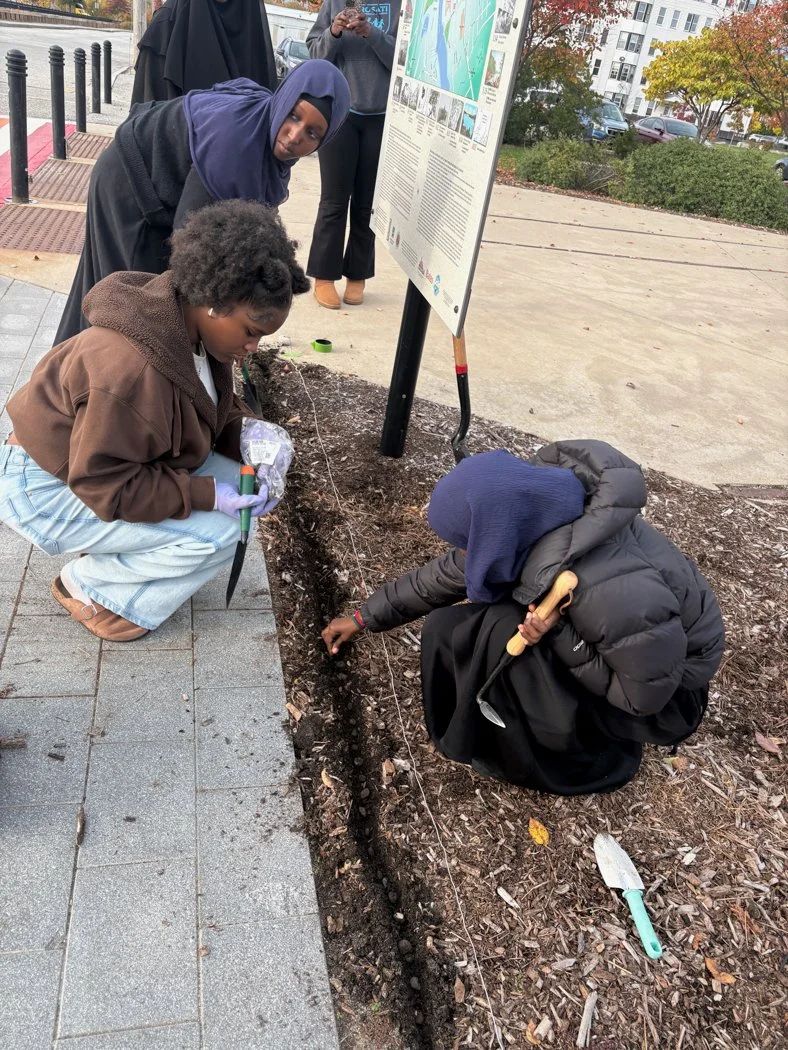MOURNING FLOWERS (HOME) (PRESS) (GARDEN) (FLOWERS) (FLOWER SLEEVES) (EXHIBITIONS) (SUPPORT) (SITES)
MOURNING FLOWERS (THE 🤟🏽(ILY) Gardens)
The 🤟🏽 (ILY) Gardens are an Act of Kindness at the intersection of public gardens, public art and urban beautification for the Lewiston-Auburn and greater local and state community following the mass shootings on October 25, 2023 in Lewiston, Maine. Mourning Flowers is an art project brings awareness to the ripple effects of trauma and fear that communities sustain after acts of violence.
Clean up and planting with Maine Community Integration (MCI) on 10/24/25 in Lewiston about 200 fall bulbs
Planting with the community on 10/25/25 in Lewiston over 1000 fall bulbs
Planting with the community on 10/26/25 in Auburn 300+ fall bulbs and pollinator friendly plants
Locations: In Lewiston: 38 Oxford + Beech St, Lewiston, ME 04240, between Lewiston House of Pizza and Station Grill Restaurant in front of the Rainbow crosswalk.
In Auburn: Bonney Park, 284 Main St., Auburn ME 04210
Parking available on Beech St. in front of Simard Payne Park
Community Plating Days: October 25, 2025 (Lewiston) 10 am - 3 pm. ASL interpreters will be available from 10-12 pm + October 26, 2025 (Auburn) from 10 am - 3 pm.
RSVP using this form so we know how many bulbs and supplies to buy.
Other days available by appointment, contact me by e-mail or at Maine MILL (207) 333-3881.
What we’re planting: Fall bulbs, wildflower seeds and pollinator friendly plants.
Partners: Auburn Conservation Commission, City of Auburn Public Works, City of Lewiston Public Works, Downtown Lewiston Association, Gather to Grow, Maine Audubon, Maine Community Integration, Maine MILL, Maine Resiliency Center, One Lewiston, Skillin’s Greenhouses, Wild Seed Project.
Artist consultants: Miia Zellner, Carly Glovinski
Donate: Tax deductible donations to support this work can be made here. Please e-mail me if you would like to become a partner, donate special skills, supplies, bulbs or plants!
A garden is a simple, accessible, and common space. The process of designing and planting alongside the community and inviting collective participation and management, will not only create a place of peace, but will foster reflection, creativity, and healing. For communities navigating grief, trauma, or anxiety after violence, nature-based environments can reduce symptoms of PTSD, depression, and isolation. Hands-on creative participation (such as planting and weeding days) engages the communal and individual body in meaningful work, a key therapeutic method for integrating grief and re-establishing agency. Open-air design ensures accessibility and reduces barriers for those who may feel overwhelmed in traditional memorial or clinical spaces or feel like they don’t belong in them.
Gardens hold the potential for change. They make communities and economies better, bring beauty even in dark times and establish sustainable ecosystems. The garden will also serve to enhance the native pollinator habitats along the Androscoggin River.
More flowers, less violence.






































































